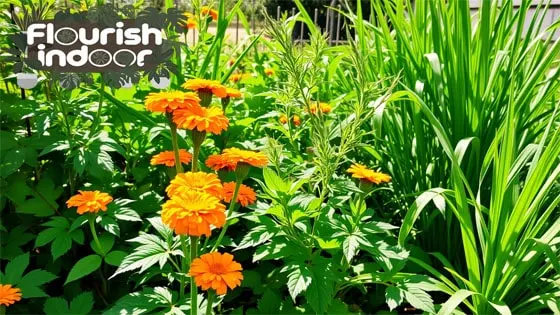These plants not only repel mosquitoes but also boost immunity and provide natural remedies for dengue symptoms. In this article, we’ll explore rare insights and innovative uses of anti dengue plant, blending science with unconventional wisdom.
 |
| Anti-Dengue Plants |
Understanding dengue and the role of anti-dengue plants
Dengue is transmitted by the "Aedes aegypti" mosquito, which thrives in warm, humid environments. While vaccines and medical treatments exist, prevention remains the best defense.Plants to combat dengue fever offer a sustainable solution by repelling mosquitoes, detoxifying the body, and even inhibiting the virus itself. These plants are easy to grow and can be integrated into gardens or homes for maximum benefit.
Key symptoms of dengue:
- High fever and severe headache.
- Muscle and joint pain "breakbone fever".
- Skin rashes and bleeding in severe cases.
Uncommon causes of dengue outbreaks
Urbanization without green spaces:Cities with limited vegetation create ideal breeding grounds for mosquitoes. Incorporate anti-dengue plants like citronella and neem to deter them.
Contaminated water containers:
Stagnant water in buckets or tires harbors mosquito larvae. Use crushed leaves of plants that prevent dengue to treat water naturally.
Overuse of chemical repellents:
Mosquitoes develop resistance to synthetic chemicals. Switch to plant-based repellents for long-term effectiveness.
Electromagnetic stress on plants:
Wi-Fi routers near anti-dengue gardens may weaken plant defenses. Relocate devices if possible.
Poor Air circulation indoors:
Stagnant air traps mosquitoes. Place dengue prevention using plants like basil near windows for natural repellency.
Preventing dengue with anti-dengue plants
Neem (azadirachta indica):Neem leaves contain compounds that repel mosquitoes and inhibit dengue virus replication. Burn dried neem leaves as a natural fumigant.
Citronella grass (cymbopogon nardus):
Known for its strong scent, citronella masks human odors, deterring mosquitoes. Plant it around your home or crush its leaves to make a DIY repellent spray.
Tulsi (holy basil):
Tulsi boosts immunity and repels mosquitoes. Place pots near entry points to keep mosquitoes at bay.
Garlic (allium sativum):
Garlic’s sulfur compounds disrupt mosquito breeding. Crush garlic cloves and mix with water to create a natural larvicide.
Lemon eucalyptus (eucalyptus citriodora):
Its oil contains PMD, a compound proven to repel mosquitoes. Use it in diffusers or apply diluted oil to the skin.
Treating dengue naturally with anti-dengue plants
Papaya leaves for platelet boost:Papaya leaf juice increases platelet count a key concern in dengue recovery. Blend fresh leaves and strain the juice for daily consumption.
Giloy (tinospora cordifolia):
Giloy enhances immunity and detoxifies the body. Boil its stems in water to make a healing decoction.
Fenugreek seeds (methi):
Fenugreek reduces fever and alleviates muscle pain. Soak seeds overnight and drink the infused water.
Coriander leaves:
Rich in vitamin C, coriander aids recovery. Add fresh leaves to soups or teas during dengue treatment.
Aloe vera gel:
Aloe vera soothes skin rashes caused by dengue. Apply gel directly to affected areas for relief.
Common problems leading to dengue spread
Neglecting garden maintenance:Overgrown gardens attract mosquitoes. Regularly trim plants and remove stagnant water.
Ignoring early symptoms:
Delayed treatment worsens dengue cases. Act immediately if fever and rashes appear.
Using contaminated water for plants:
Dirty water introduces mosquito larvae. Always use clean water for irrigation.
Reusing infected containers:
Buckets or pots from previous outbreaks harbor eggs. Clean them thoroughly before reuse.
Late-season planting:
Plants stressed by late planting are less effective. Stick to recommended planting schedules.
Unique insights for anti-dengue plant management
Sound wave therapy:Play low-frequency sounds (50–60 Hz) near immunity-boosting plants for dengue to enhance their growth and repellency.
Moon phase planting:
Plant during the waxing moon phase to strengthen roots and improve mosquito-repellent properties.
Companion planting:
Grow garlic alongside tulsi their combined scents deter mosquitoes more effectively.
Probiotic soil drench:
Add fermented compost tea to soil to boost plant health and repellency.
UV-C light therapy:
Shine UV-C lamps on plants for 10 minutes daily to kill mosquito eggs on leaves.
Step-by-step guide to using anti-dengue plants
Plant selection:Choose plants like neem, citronella, and tulsi based on your climate and space.
Strategic placement:
Place eco-friendly dengue prevention plants near windows, doors, and water sources to maximize repellency.
DIY repellent spray:
Crush leaves of citronella or lemon eucalyptus, mix with water, and spray around your home.
Natural larvicide:
Crush garlic or neem leaves and sprinkle them in stagnant water to kill mosquito larvae.
Monitor effectiveness:
Observe mosquito activity and adjust plant placement or treatments as needed.
Frequently asked questions
What are the best anti-dengue plants?
Neem, citronella, tulsi, and lemon eucalyptus are highly effective anti-dengue plants.
Can papaya leaves cure dengue?
Papaya leaves don’t cure dengue but help increase platelet count, aiding recovery.
How do anti-dengue plants repel mosquitoes?
These plants release natural compounds that mask human odors and deter mosquitoes.
Are anti-dengue plants safe for pets?
Most are safe, but avoid excessive use of essential oils around pets. Consult a vet if unsure.
Why does dengue keep spreading despite repellents?
Resistance to synthetic chemicals and poor environmental management contribute to outbreaks.
This article blends science and creativity to tackle dengue prevention and treatment using anti-dengue plants. By addressing hidden triggers and experimenting with innovative methods, you’ll protect your home and loved ones from this deadly disease.

